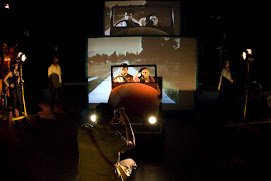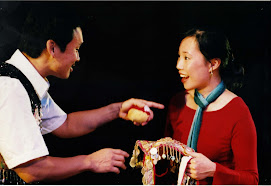Let's begin with sofas and how much I loathe them on stage. Especially ratty brown ones. I often write ‘absolutely no sofas’ in the production notes of a script, and with one terrible exception (an armchair) back in 2000, I’ve managed to keep soft furnishings out of my work. If you want to see couches, go to Ikea.
To me, sofas on stage are the theatrical equivalent of bookshelves in documentary films—the expert interviewed in front of his packed bookcase. This is not because I’ve got anything against domestic or office décor per se, (I love books and have crowded shelves of my own) it’s because a sofa represents a certain kind of play and production.
At various points I’ve tried to write these more traditional narrative dramas with plots and character journeys and naturalistically-inclined dialogue. The kinds of plays that get programmed in subscription seasons. What usually happens though, is I get to about page 5 and complete anarchy has broken out—I want to introduce a robot or a flock of singing sheep, or I find that one of my sensible characters has flipped his arc to riff on the difference between moths and butterflies, which, BTW, is not night and day. From time to time, generally when I’m looking at a 2-digit bank balance, I’ve berated myself for not trying harder to write this kind of play. But not any more. This is the year I finally admit that I don’t much like conventional narrative drama, and I don’t want to write the stuff. It’s not my shtick. So my motto for 2010 is: embrace your inner maverick.
Speaking of which, I saw Tim Key’s show The Slutcracker on Saturday. A wonderful and wonderfully idiosyncratic mish-mash of poetry, performance, film, philosophical nuggets and improv. It’s daggy and meandering and clever and funny, and best of all, utterly unpredictable. Unlike the STC’s Tot Mom. After 5 minutes, I knew where that was going. The critics loved it, as did a number of friends and colleagues. What can I say? It had a lot of chairs of the hard, un-upholstered variety, but at least it had no sofas.
25 January 2010
23 January 2010
Research fever
Years ago, for fun, I did an online psychology test designed to reveal your particular character strengths and inclinations. Curiosity came out as my number one, which perhaps explains why I find myself, not yet 4 weeks into the new year, in a research frenzy. Other writers talk about ‘research fever’, but I fear I’ve gone past the fever and into the frenzy. The reason?—weeds.

My desk is a Manhattan skyline of books about weeds. Texts recent and old, scientific pamphlets, surveys, fieldguides, fictional weeds, Australian weeds, foreign weeds, even sci-fi weeds. The floor is awash with printouts and pages of notes, my computer loaded with databases and login codes for various libraries.
A bit of backstory: Weeds are a long-standing interest of mine, and I’m researching them now for 2 projects. One is a personal essay/non-fiction piece for radio called Weeds Etc. The other is one of the 2 projects for which I’ve got a New Work grant from the Australia Council Literature Board: an unconventional memoir in 11 parts.

The difficulty—my difficult—is that everything I read suggests several more things to seek out and read, suggests other avenues of inquiry, spreads into new areas of imagining. And it’s all fascinating and absorbing and I just want to keep on finding out more …
So how much is enough? How do you know when to stop with the research and start with the writing? Begin drafting that first rough version of the script or chapter or poem? How do you decide what is necessary, and what is overkill? Can research become a way of avoiding the harder task of actually writing? Something like:
Research = relatively easy + comfortable
Writing = difficult ∴ put off for as long as possible
Although of course, the equation isn’t that simple. Because research is not only about digging for information, it’s also about thinking, about ideas marinating, about living with the material and its myriad possibilities. It’s about letting your sensibility permeate your findings, it’s about sticking one thing to another, and about the deep pleasure of discovery.
Nevertheless, I shall have to draw the line at some point and move into the writing phase. (Which may require further research because the 2 phases do not exist each in their neat separateness, but are parts of the one, somewhat elastic process that is writing ...) To that end I will stop this post here. (Is blogging another way to avoid writing the script or poem or essay in hand?) And return to the strange and captivating world of weeds.
Subscribe to:
Comments (Atom)
+Photo+Leah+McGirr+3.jpg)



